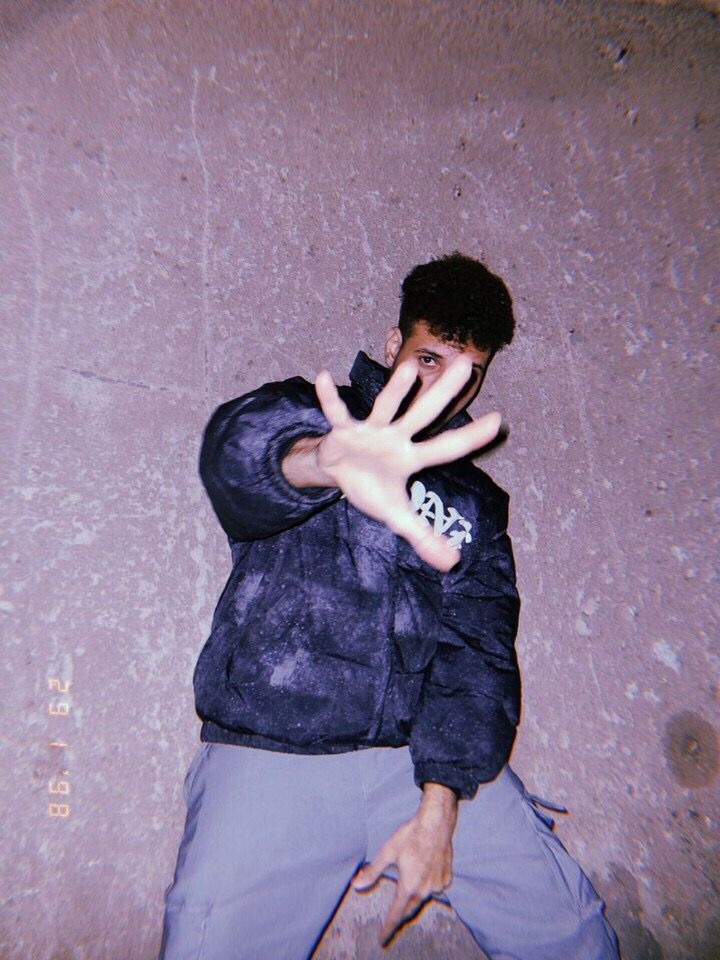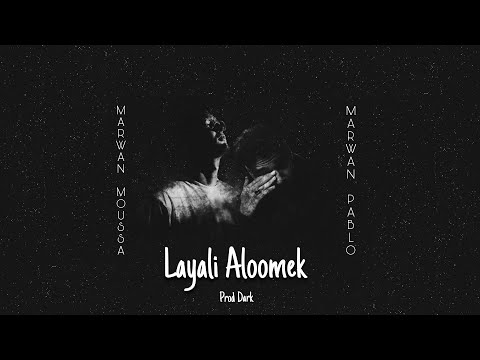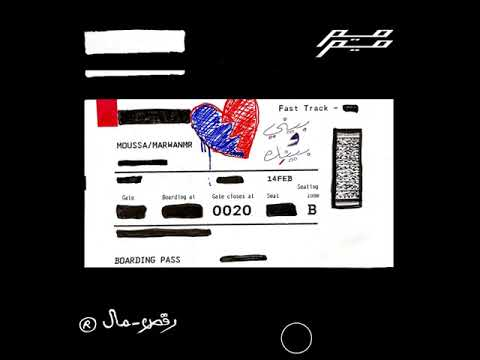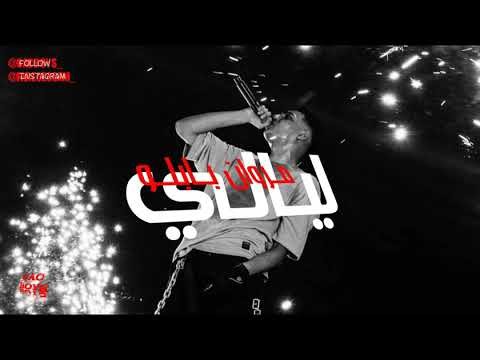The Music Dark Knight Rises
Conversations with Egyptian Music Producer Loay (D.A.R.KK_)

Loay or, as he calls himself, D.A.R.KK
It was summer. I always discovered music through the long summery nights, when I’m wearing as little as possible, ice cream keeps my fingers sticky, and new tunes flow into my stream of consciousness, interrupting my train of thought.
It was summer when I first heard this mashup, this remix. I was aware of the Egyptian rap scene bursting with liveliness, angry music, and young men exploding with expletives, brokenness, and an unexpected fragility talking about everything from drugs to betrayals, sex, getting wasted, and of course, being unbeatable gangsters with stacks of cash and everything at their disposal.
Many names stood out. It started with fellow Alexandrian Marwan Pablo, then -again- fellow Alexandrian Wegz, and the names kept rolling, like mollies on a tongue. There was the mysterious Lege-Cy, Marwan Moussa who was the typical Eminem-like rapper, the more chill drug-hazed Abo El Anwar, and the gritty Moscow with street cred and a bite. Too many Alexandrian rappers, is that a coincidence?
“I am from Madinet Nasr in Cairo, there are a lot of Alexandrian rappers because rap songs revolve in so many ways about the sense of belonging and brotherhood, and that’s something crucial in the lives of people from Alexandria. But it’s important in young men’s lives in general, this invisible bond of belonging and backing each other up, which is in multiple rap and trap tracks.
Then there were talented, young music producers, working their magic with song mixes, remixes, and mashes. That was when I heard “Layali Aloomek” or -literally- “Nights I Blame You” for the first time, a remix that rocked Egyptian summers in 2022. As I dug deeper, I discovered the young prodigy behind it; Loay or, as he calls himself, D.A.R.KK.

Layali Aloomek – Remixed by D.A.R.KK, mixing “Layali” by Marwan Pablo and “Aloomek” by Marwan Moussa
D.A.R.KK is a 19-year-old Egyptian man who loves what’s new in everything, technology, the music scene, travel, etc. He loves to stray from the norm and discover new places, seeks new experiences at the core of his existence, and takes risks. He created his alter ego D.A.R.KK as a reflection of his real self but within the world of music where he found his true passion ever since he was a kid.
There was something about “Nights I Blame You”, the incorrect structure of his wording in which he just stuck both titles of the original songs: “Layali – Nights” by Marwan Pablo and “Aloomek – I Blame You” by Marwan Moussa. Both songs couldn’t be more different as both rappers had a distinctive style. Instead of calling the song “I blame you night and day” or “For Nights I’ve Been Blaming you” to make the remix more coherent, D.A.R.KK simply called “Nights I Blame You” so that listeners wonder; who is he blaming exactly. The nights, the girl, or maybe someone else?
“It all started when I was a kid, I would use anything at my disposal to create a rhythm. This lasted until 2015 when I became interested in knowing how this magical thing “music” works. I wanted to teach myself so I researched on YouTube until I discovered Fl Studio and started making experimental beats in 2018. The turning point came in 2020 when I started uploading my music on YouTube and found unexpected positive feedback. I wanted a change so I made uploading my tracks something that I do regularly.”

It was like Pandora’s box, but what came out wasn’t all the evil and pain in the world, but a mix of feelings, pains, and different forms of expressing infatuation and arousal. These young boys talked about being in love like nobody else, whether it was Db Gad, who wanted to take his girl to Alexandria through the ghettos and show her the inner-city, to Lege-Cy professing his love to his girl as her fiery flames burned his insides. He melts, and betadine cannot disinfect his wounds, infected by her love.
These two songs were different. Moussa’s “Aloomek” was a double-edged blame game between two toxic people, a relationship on equal grounds where two lovers played Russian roulette. But “Layali” was typical Marwan Pablo, an Alexandrian rapper whose poetry always expresses fragile masculinity, Gen Z sense of dissociative identity, and a burden of a man whose surroundings force him to be tough but his artistic self softens him against his will. Moussa talked about a lover who was the drug to his senses and making out on the roof with a bottle of Havana Club and Goose vodka. Pablo talked about offering his love to the fair maiden, his lady, and someone with whom he can be a knight, taking care of her and protecting her from the world. With his remix, the song seemed like an extended inner monologue by a man burdened by darkness and passionate for the woman who haunted his nights.

They are two distinct worlds that couldn’t be more alienating to each other. But his boldness and musical talent led D.A.R.KK to create a song that somehow seemed genuine and truthful.
“Since I was little, I listened to a myriad of genres, but as the music progressed in the 2010s, I found myself leaning toward genres such as trap, R&B, and hip hop, I was constantly inspired by various artists whether Egyptian or from other parts of the world. I am the kind of person who gets stuck listening to one track on a loop, so the idea wasn’t new to me. I could make a remix for a track I originally loved and try to reach the same vibe through an enhanced technique. My aim was always that the cover track would surpass the original and find its way into the original fans’ playlist.
With [Layali Aloomek] I was already hooked up on the Marwan Moussa Aloomek track and it was on repeat constantly in my playlist so I wanted to create a remix that included Pablo’s track with it using a Lo-fi beat. And I released it and found that audiences loved my track.”
People didn’t just love D.A.R.KK’s track, they devoured it. The track has reached 200k views on YouTube and D.A.R.KK has 30k monthly listeners on Spotify. The young man has since made multiple other remixes but somehow, Layali Aloomek overshadows everything else he has done.
“This was unexpected and it only proved that if you made something unique that you are truly passionate about you would reach your dreams.”
I had to ask the young man about the creative process and how long it takes to make one track,
“I have a musical ear, and for every track, I have to understand the tempo and the key before I start working on it. As soon as I find two tracks with the same key and tempo, I separate the vocals, then put them in a project, finally I build up the melody on the vocals, then drums, and so forth, until I have my track ready.”
Pablo has been the most used artist in D.A.R.KK’s music world, with his tracks being the ones most used in remixes and such, I had to ask him what he found unique about the 27-year-old Alexandrian rapper,
“When I use a certain artist’s songs for remixes a couple of times, his tracks put me through a Sufi trance of sorts. I’m just like a lot of other guys, I listen to Pablo and I try to measure every track on its own, some tracks cannot be remade, remixed, or covered. Some tracks can be standalone in the remix. Pablo’s tracks can have chemistry with many other artists.”
Intrigued by his description of music as Sufi tracks, I asked D.A.R.KK about other artists to whom he reacts similarly,
“Most young men my age listen to rappers because we are from the same age group. We have gone through similar experiences and hardships. They write exactly how they feel, and correlate with things happening in our lives. They are unlike other musicians from years before. That’s why I don’t listen to older music because even if I like something old, I prefer to remix it and create something new out of it.
Haunting has been a word that came to mind ever since watching Baz Luhrmann’s Elvis in 2022. Austin Butler’s voice and eyes haunted me as he stared down at the audience or played tunes on his piano in a dark room. “Layali Aloomek” haunted me with its ethereal qualities and reverberating sounds. I asked D.A.R.KK if he believed some songs were haunting and others were not,
“I believe in that. Whenever I listen to a track, I tie it to the time and place I am in at this stage in my life. It becomes connected with this particular moment. So that if I listen to it later, it immediately transforms me to this stage in my life.”
D.A.R.KK dreams of collaborating with one of his favorite artists. He wants to create a different wave as a music producer, synergistically meshing his talent as a music producer with the artists to create a sound unheard of before. His interest in songs surpassed a musical fascination and hit deep into the themes and elements that shape the current musical scene in general, truth was something that he highly valued,
“Guys my age love rap and trap because the artist writes their songs, it’s unlike other mainstream [Arabic] songs with all due respect where you don’t feel the truth of the singer. I am not convinced when an artist writes about pain or injustice when he’s living a completely different life of luxury. I can’t listen to something that I don’t believe in. Not to mention that other Arab singers only showcase the bright side of their lives, and they also sing it, unlike rappers who are so open and bring you into the heart of their experiences, good or bad, so that means with other singers, I’ll only listen to you if I’m in a good mood, but they can’t sell me their music otherwise.
The real world is not as beautiful as Amr Diab or Tamer Hosny -two veteran Egyptian pop singers- paint it out to be. Rappers do that for us. They sing our feelings, express our anger and frustration, our pain. We’ve all been through the same but they just know how to express it poetically.”
Poetry takes so many shapes and forms, if Bob Dylan is one of the contemporary poets, then I don’t see how Tupac and Eminem cannot be considered the same. And if this applies to the West, then why not consider Pablo, Wegz, Moussa, and other contemporary poets but their street language and gritty expressions of modern-day life can be their gospels.
